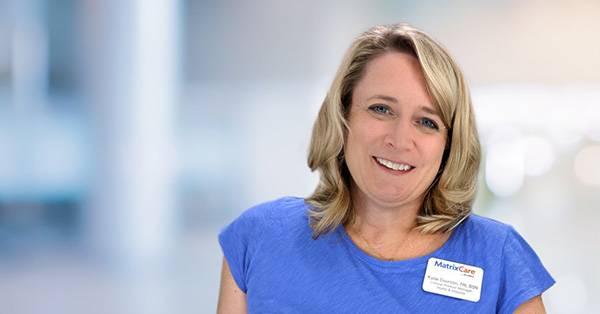- Solutions
- Solutions
- Home Health
- Hospice
- Life Plan Community
- Palliative Care
- Private Duty
- Senior Living
- Skilled Nursing
- Skilled Nursing
- Skilled Nursing Software
- Advanced Insights
- Customer relationship management
- Data and analytics
- Financial & operations management
- Marketing
- Nutrition management
- Referral management
- Regulatory compliance
- Retail management
- Resident engagement
- Revenue cycle management
- Skilled nursing interoperability
- Partners
- Blogs
- Resources
- About
- User Conference

The hype (and over-hype) of AI in home-based care
Many organizations are facing headwinds with staffing shortages and operational efficiencies in home health and hospice. As these providers seek creative ways to face these challenges in healthcare, some technologies are evolving to offer groundbreaking solutions to the industry’s biggest problems.
One of the fastest evolving technologies is artificial intelligence (AI). And while post-acute care is behind in adopting AI, organizations can no longer ignore the benefits it can bring to their business.
“With AI capabilities, such as machine learning (ML), computer vision, and natural-language processing (NLP), companies in all industries can use data and derive insights to automate processes, add or augment capabilities, and make better decisions.”
In this blog, we discuss how AI can help the home health and hospice industry — and the AI tools that are over-hyped.
What is AI (and what is it not)?
AI looks at broad sets of information and derives population-level insights. Care professionals then need to personalize the treatment plans based on their knowledge of the situation and the patient’s preferences, issues and history.
While AI filters through large samples of data and identifies “signals” that are strong predictors that an event has or will occur, it’s not a panacea. Its only as good as the models created and the information that we feed into it.
AI is not there to diagnose patient issues, but rather to raise insights and awareness to information and trends that healthcare workers can use to diagnose and treat patients. Great care will continue to rely on skilled, dedicated and informed home health professionals.
Examples of AI in home-based care
Fall risk
One example of AI in home-based care is fall risk, where large samples of data combined with accurate tracking of actual events point back to key objective and subjective information that can be easily collected. This data includes changes in medications, not taking prescribed medications, dehydration, changes in gait or walking style, and changes in activity level.
Machine learning in healthcare also filters through body-worn sensors, such as personal safety and alert devices, to detect with high accuracy when an actual fall has occurred versus someone just sitting down rather abruptly.
Behavioral health
Another example of AI in home-based care is behavioral health. Similar to fall risk, subjective information (e.g., how did the patient feel today?) combined with objective information (e.g., did the patient take their medications as prescribed?) can yield remarkably accurate assessments based on population comparisons. This can then be tailored and refined at the individual level over time.
Where does AI fall short in home-based care?
AI fails to handle fringe or “exceptions.” Personal metrics can vary significantly and can be temporal in nature. An AI system may identify a possible cause, but it really comes down to the healthcare professional to make decisions based on their understanding of the patient, the longitudinal patient record and their own unique history.
Maximize AI for your organization by using it to intelligently analyze data, helping you gain insight into your patient population and make more informed decisions.
Connect with us today to learn about our innovative tools that can help you grow your business and improve patient care.
See what MatrixCare can do for you
Tim Smokoff
Tim is the General Manager, Home Health and Hospice, at MatrixCare. He is a seasoned healthcare leader, keenly focused on advancing data-driven technology solutions, driving operational excellence, and fostering strategic innovation. Building on more than 25 years of extensive success leading software operations, Tim guides the overall strategic direction and operational execution of MatrixCare's Home Health and Hospice business vertical.
Related Posts



The Hospice FY 2025 Final Rule is released: What are next steps to be taken by hospices?
READ MORE >>
See MatrixCare in action
Start by having a call with one of our experts to see our platform in action.
MatrixCare offers industry-leading software solutions. Thousands of facility-based and home-based care organizations trust us to help them improve efficiency and provide exceptional care.
© 2025 MatrixCare is a registered trademark of MatrixCare. All rights reserved.




